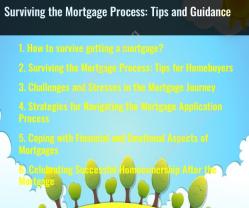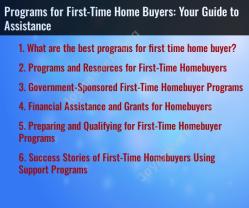How to get started in the mortgage business?
Getting started in the mortgage business involves several key steps to build a successful career in the field. Here are the essential steps to consider:
Educational Requirements:
- Obtain the necessary education and training. Most mortgage professionals have at least a high school diploma or equivalent, but some positions may require a bachelor's degree in finance, business, or a related field. Consider taking courses or obtaining certifications related to mortgage lending.
Licensing:
- Check the licensing requirements in your area. Mortgage professionals, such as loan officers, brokers, and mortgage loan originators, are typically required to obtain licenses. Licensing requirements vary by state and country, so make sure to research and comply with your local regulations.
Choose Your Mortgage Career Path:
- Decide on your specific role within the mortgage industry. Common roles include mortgage loan officer, mortgage broker, underwriter, processor, appraiser, and more. Your choice will determine your specific responsibilities and licensing requirements.
Gain Industry Experience:
- To succeed in the mortgage business, it's valuable to gain relevant experience. This might include working as a loan processor, loan officer assistant, or in a related position to learn the ropes of the industry.
Network and Build Relationships:
- Networking is crucial in the mortgage industry. Establish relationships with real estate agents, builders, financial institutions, and other professionals involved in the homebuying process. Attend industry events and join associations to connect with potential clients and partners.
Compliance and Regulations:
- Stay updated on mortgage regulations, laws, and compliance standards. The mortgage industry is highly regulated, and compliance is essential to avoid legal issues and provide ethical service to clients.
Familiarize Yourself with Mortgage Software:
- Get comfortable with mortgage software and tools commonly used in the industry for processing applications, underwriting, and managing client information.
Develop Sales Skills:
- If you're working as a mortgage loan officer or broker, sales skills are essential. You'll need to build a client base and effectively communicate the benefits of your services to potential borrowers.
Work with a Mortgage Company or Start Your Own:
- Decide whether you want to work for an established mortgage company, a bank, or credit union, or if you want to start your own mortgage brokerage or lending business. Each option has its pros and cons.
Continuing Education:
- The mortgage industry is dynamic, and regulations change. Commit to ongoing education and training to stay current with industry trends and regulations.
Market Yourself:
- Create an online presence through a professional website, social media, and other marketing channels to attract potential clients and build your brand.
Obtain a NMLS Number:
- If you're working as a mortgage loan originator in the United States, you'll need to obtain a unique NMLS (Nationwide Multistate Licensing System) number. This number is used to track your mortgage lending activities and is required for licensing.
Join Professional Associations:
- Consider joining professional associations like the Mortgage Bankers Association (MBA) or the National Association of Mortgage Brokers (NAMB). These organizations can provide networking opportunities, education, and resources.
Seek Mentorship:
- Finding a mentor in the mortgage industry can be highly beneficial for learning the nuances of the business and gaining insights from someone with experience.
Compliance with Ethical Standards:
- Ensure that you uphold ethical standards and prioritize the best interests of your clients. Building trust is essential in the mortgage business.
The mortgage business can be financially rewarding, but it requires dedication, compliance with regulations, and strong relationships with clients and industry partners. Keep in mind that it may take time to build a solid client base and establish your reputation in the industry.
Getting Started in the Mortgage Business: Key Considerations
If you are interested in a career in the mortgage business, there are a few key things to consider:
- Education and licensing: Mortgage professionals must be licensed in the state where they work. To obtain a license, you must complete a pre-licensing course and pass a state exam. Some states also require mortgage professionals to have a college degree.
- Job experience: Many mortgage lenders require their employees to have some job experience in the mortgage industry or in a related field. You can gain experience by working as a loan processor, loan officer assistant, or mortgage broker.
- Networking: Networking is important in any industry, but it is especially important in the mortgage business. Get to know other mortgage professionals, such as real estate agents, loan officers, and underwriters. Networking can help you find job opportunities and build a referral base.
Exploring Career Opportunities in Mortgage and Lending
There are a variety of career opportunities in mortgage and lending. Some of the most common jobs include:
- Loan officer: Loan officers help borrowers obtain mortgages. They work with borrowers to assess their financial situation and find the right loan for their needs.
- Loan processor: Loan processors gather and verify borrower documentation. They also prepare loan applications for underwriting.
- Underwriter: Underwriters assess the risk of a loan application. They review borrower documentation and make a decision on whether to approve the loan.
- Mortgage broker: Mortgage brokers work with multiple lenders to find the best loan for their clients. They typically charge a commission for their services.
Education and Licensing Requirements for Mortgage Professionals
The education and licensing requirements for mortgage professionals vary from state to state. However, most states require mortgage professionals to complete a pre-licensing course and pass a state exam. Some states also require mortgage professionals to have a college degree.
To find out the specific requirements for your state, you can visit the website of your state's department of banking or financial institutions.
Building a Successful Career in the Mortgage Industry
To build a successful career in the mortgage industry, it is important to:
- Stay up-to-date on industry trends and regulations: The mortgage industry is constantly changing, so it is important to stay up-to-date on the latest trends and regulations. You can do this by reading industry publications, attending conferences, and taking continuing education courses.
- Provide excellent customer service: Mortgage borrowers are often making one of the biggest financial decisions of their lives. It is important to provide them with excellent customer service and to answer all of their questions.
- Build relationships: The mortgage business is a relationship-driven business. Build relationships with real estate agents, loan officers, and other mortgage professionals. This will help you generate leads and close more loans.
The Future of Mortgage Business and Industry Trends
The future of the mortgage business is bright. The housing market is expected to continue to grow in the coming years, and there will be a strong demand for mortgage professionals.
Some of the industry trends that are shaping the future of the mortgage business include:
- The rise of online lending: More and more borrowers are using online lenders to obtain mortgages. Online lenders offer a convenient and streamlined mortgage process.
- The use of technology: Mortgage lenders are increasingly using technology to automate tasks and improve efficiency. For example, many lenders now use automated underwriting systems to make decisions on loan applications.
- The growth of the reverse mortgage market: Reverse mortgages are becoming more popular with retirees. Reverse mortgages allow homeowners to borrow against the equity in their homes without having to make monthly mortgage payments.
If you are interested in a career in the mortgage business, now is a great time to get started. The industry is growing and there are many opportunities for qualified professionals.













